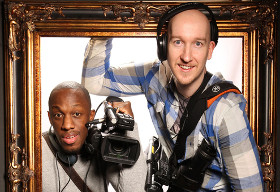Michael Coveney: West End poster boy Russ remembered in a Muse of Fire
Some of the biggest and best West End shows are defined by their posters: a glinting pair of cat's eyes, an angelic waif with a tricolour, a white Venetian carnival mask, a squiggle of a helicopter on a burnished background; I mean, of course, Cats, Les Miserables, The Phantom of the Opera and Miss Saigon.
And they are just four big shows of one producer, Cameron Mackintosh, who hosted Friday's lunchtime memorial party for the great graphic artist Russ Eglin, who died earlier this year, after four decades at the creative heart of the Dewynters advertising and marketing agency, which he co-founded with Robert Dewynter and press rep Anthony Pye-Jeary. Their first big commission was Jesus Christ Superstar, and the rest, as they say, is hysteria, both professional and financial.
Russ's partner, Sherry, her voice as smooth and sweet as a large Harvey's, welcomed guests to the downstairs Delfont Room in the Prince of Wales Theatre. The roster of first-rank producers alone testified to the esteem in which he was held: not only Cameron, but also Andrew Lloyd Webber, Tim Rice and Lee Menzies (fairly fresh from Eternity), Michael Codron, Robert Fox, Paul Elliott and Duncan Weldon (soon to celebrate 45 years together in the business), Alex Armitage, Richard Pilbrow and James Vernon.

Anthony Pye-Jeary, taking the stage, said that the actor and producer Michael Medwin, now 90 years old, was due to come, but had rung up to say that he'd decided to get married instead. Gillian Lynne exchanged greetings with Christopher Biggins, Liz Robertson made me promise I'd see her cabaret show next time round (missed it twice so far) and designer John Napier told me he'd given up theatre and was soon to exhibit his sculpture and painting. James Vernon, now semi-retired, re-lived briefly two of the extraordinary artists he presented and I reviewed, Marcel Marceau and Spike Milligan (in separate solo shows).
Mackintosh himself, who once told Russ that the only bit of producing he actually enjoyed was the first night party and designing the poster, was bouncing around like Tigger, as usual. He hailed the genius of "Rusty'" and his work and also the improvisatory aspect of, for instance, the poster for the ill-fated Carrie, which resulted from an accidental, random spattering of red paint blobs, or the beige background commonly known as "chunder" for Miss Saigon and other musical theatre enterprises.
He also recalled the hilarious outing to Hamburg for the triumphant German premiere of Cats, for which he hired a small German aircraft, a right little Fokker it was, to transport the production team and select hangers-on, ending up with a late-night session in a drinking dive on the Reeperbahn following the absurdly lavish and brilliant after-party.
A buxom hostess, with a spectacular "rack," said Cameron, holding his hands a yard or so in front of him to make the point, or two of them, approached Russ and asked breathily if there was anything else she could do for him, leaning solicitously forward and further exposing her decolletage. "Yes," growled the thoroughly relaxed sketch artist, "I'd like another large whisky…" and promptly stuck his glass in that accommodating, versatile rack.
Two more contemporary-looking poster boys, Dan Poole and Giles Terera, have made an entertaining "road movie" documentary, Muse of Fire, shown on BBC4 last Thursday (but still available on the BBC iplayer), asking who's afraid of Shakespeare. This question was less pressing an enquiry than that of Al Pacino – obviously the model – going in search of Richard III, so they made a bit of a hoo-ha over actually making the film, getting about, living on the cheap and so on; this was the less good part of it.
The really good part was a series of mini master-classes from Ian McKellen, Jude Law, Judi Dench, Brian Cox, Fiona Shaw and voice coach Cicely Berry ("There's never really a full stop till the end of the play"), with some lightning cameos from Mark Rylance, Zoe Wanamaker, Ralph Fiennes and Julie Taymor, all proving you don't need half an hour to say something interesting.
The real stars, though, were Steven Berkoff – who chewed out a speech of Coriolanus to show that Shakespeare should always be done in modern costume (as he was done originally) – and American academic guru Harold Bloom, sight failing after a lifetime of reading, saying that Shakespeare was the first person to write so many characters who all spoke differently from each other: "There is no-one like him before, or after."
Their quest culminated in a frankly flat conversation with the brilliant filmmaker Baz Luhrmann, whose Romeo + Juliet had first turned on the boys to the bard. And they particularly loved the poster, one that Russ Eglin didn't design but would surely have approved in its mixture of message and modernity.












